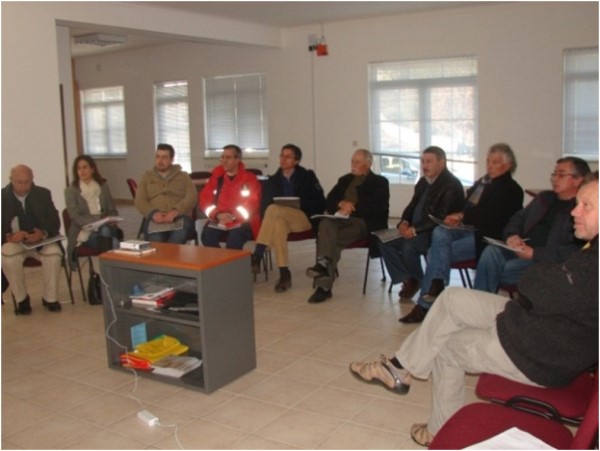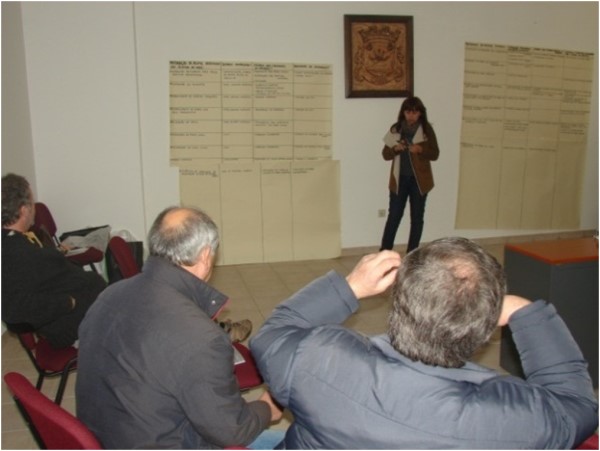| Authors: | Cecelia De Ita, Lindsay Stringer, Luuk Fleskens, Andy Dougill, with input from study sites |
| Editor: | Jane Brandt |
| Source document: | De Ita et al. (2015) Report on stakeholder adaptation strategies in the CASCADE study sites. CASCADE Project Deliverable 8.1. |
The main changes noticed by stakeholders in Várzea-Calde, Portugal were changes to biodiversity. These were more severe after 2000, attributable mainly to wildfires. Among the drivers of change mentioned by the different groups of stakeholders in Portugal are rural abandonment (100%), wildfires (75%) and changes in agricultural farming practices (50%).
Table: Drivers of change mentioned by different stakeholders in Várzea-Calde, Portugal.
| NGO | Government representative | Land User | Private sector | |
| Climate change | X | |||
| Rural abandonment-reduction/ abandonment in cultivation and/or farming | X | X | X | X |
| Changes in agricultural and/or farming practices | X | X | ||
| Lack of environmental and infrastructure management | X | |||
| Wildfires | X | X | X | X |
| Environmental factors | X | |||
| No fiscalization | X |
During the focus group, stakeholders were asked to vote for the two or three changes that they considered more relevant or more evident in the area. Afforestation of agricultural lands due to land abandonment was the most relevant change perceived by stakeholders (7 votes), followed by the increase of private forest areas occupied by fast growth species (Eucalyptus), the spreading of invasive species and the expansion of shrubland due mainly to wildfires (5 votes each).
Many of the drivers of change were considered to be closely interlinked. Most of the stakeholders mentioned that as a consequence of land abandonment, there was an increase in the biomass due to the lack of management, which in turn increases the risk and occurrence of wildfires. This in turn caused the abandonment of agricultural areas, as noted by a member of the private sector. During the focus group, it was also mentioned that the abandonment of agricultural areas led to the afforestation of land, dominated by fast growth species (Eucalyptus globulus), as well as the spread of invasive species such as acacias (Acacia sp.) and the expansion of shrubland. The changes in wildlife were also a cause of concern, and a representative from the Apiculture Association said that “there is a decrease in the number of wolves, foxes, rabbits and hunting resources, and an increase of the wild boar population”. It was generally considered that changes had led to a loss of environmental resilience, noticed through a decrease in pine regeneration and the appearance of marginal areas with unproductive soil.


Stakeholders in Várzea-Calde, Portugal found it difficult to answer the questions about adaptation measures, especially those relying on the forest for their livelihoods. A government representative asserted that an adaptation response to regime changes was the constitution of the Municipal Forest Technical Offices. The Municipal Forest Technical Offices were created by Government Order after the catastrophic summer fires of 2003 and 2005, with the aim of having forest technicians at the local level to support the design of the municipal plan for forest protection against fire, and to support local forest management. Other adaptation measures were to relocate activities (such as beehives for beekeeping) to more suitable areas, and actively manage the forests by removing affected trees and planting fast growing trees such as Eucalyptus globulus and Pinus pinaster. Almost every stakeholder (except the private sector representative) envisaged negative changes to the environment in the future, as a consequence of wildfires and the lack of, or poor, environmental management practices. The main consequences mentioned were the lack of regeneration of the natural vegetation, increased areas without vegetation or with shrublands or Eucalyptus, and a consequential decrease in agricultural and productive areas.
When asked about the economic/policy support needed to facilitate adaptations, stakeholders in Portugal mentioned 26 proposals that were not restricted to policy or economic support, but which also covered the facilitation and accessibility of the policies in place, and their enforcement.
Table: Summary of the stakeholders’ perceptions about future regime changes, the land management changes required,
and policy/economic support needed for adaptation in Várzea-Calde, Portugal.
| Stakeholder Group | What future regime changes do you expect? | What change(s) to current land management practices will be required? | What policy / economic support is required to facilitate the adaptations and changes |
| Government Representative | • Deforestation, loss of vegetation and increase in invasive species. • Increase in unmanaged forested areas. • Decrease of agricultural areas. • Lack of regeneration after wildfires. |
• Increased state intervention as a regulative force. • Incentives to increase agriculture. • Local awareness activities for landscape management, good practices and new alternatives. • Reinstate reforestation. |
• Major dissemination and accessibility to incentives and subsidies. • More support to private owners. • Restriction of Eucalyptus and support for Pinus pinaster. • Socio-economic policies to attract investment to rural areas. |
| NGO | • Frequency of wildfires increased. • Increase in shrubland and forest biomass. • Changes in biodiversity and the landscape. |
• Active forest management. • Diversification of forest areas • Increase buffer areas. • Improve or maintain forest paths and fire breaks. • Re-use agriculture areas. • Define forest properties in a registry at national level. |
• Subsidies for clearing forest biomass, repairing forest paths and support the activities of small-scale forest owners. • Technical support for local communities. |
| Private sector | • Decrease in the regeneration capacity of natural vegetation after wildfires. | • Active forest management. • Forest land consolidation. |
• Simplify the bureaucratic processes to apply for public funds. • Increase fiscalization and the incentives for land consolidation. |
| Land user | • Increase in wildfires and shrubland. • Appearance of areas with unproductive soils. |
• Increase social responsibility, for individual plots. • Active forest management. |
• Increase the incentives for private forest owners. |
One government stakeholder mentioned that there was a “lack of forest management” and “no fiscalization” and suggested that a useful adaptation measure would be the “application of subsidies for clearing the forest and for reforestation”.
Note: For an overview results of the workshops on identifying adaptation strategies in all study sites and the concluding recommendations see »Adaptation strategies.
